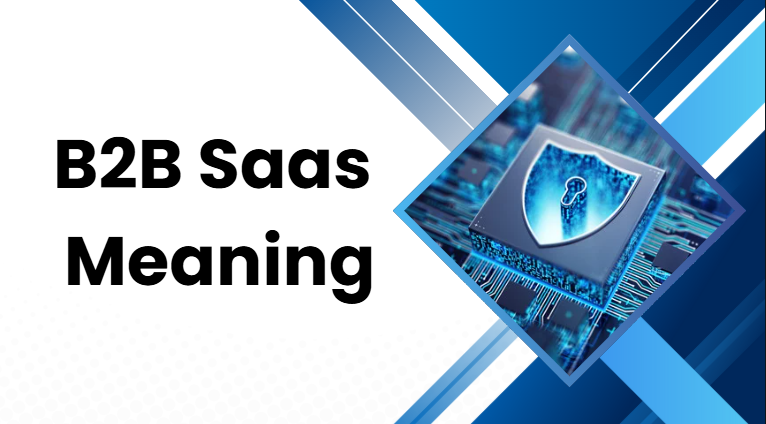In today’s fast-changing digital world, businesses rely on smart software solutions to grow and operate smoothly. One term that often appears in the tech and business world is B2B SaaS. If you’re new to this term, don’t worry. This article will explain what B2B SaaS means, how it works, its benefits, and why it’s becoming so popular among companies.
What Does B2B SaaS Mean?
B2B SaaS stands for Business-to-Business Software as a Service. It means a cloud-based software that one business provides to another.
Instead of buying and installing software on their computers, companies use these tools online through a subscription model — usually monthly or yearly.
In simple words, B2B SaaS companies sell software services to other businesses, not to individual consumers.
Example
Think of platforms like Salesforce, Slack, or HubSpot. These are B2B SaaS companies that help other businesses manage sales, communication, and marketing using online tools.
Breaking Down the Term: B2B + SaaS
1. B2B (Business-to-Business)
This means a business selling products or services to another business. For example, a marketing agency using a CRM tool made by another company.
2. SaaS (Software as a Service)
This is a software delivery model where users access the application via the internet. The software is hosted by the provider on their servers, so businesses don’t have to install or maintain it.
When you combine these two, you get B2B SaaS — software tools made specifically to help other businesses perform better and grow faster.
How Does B2B SaaS Work?
B2B SaaS runs entirely online. Here’s how it typically works:
- A company signs up for the service on a SaaS provider’s website.
- They pay a subscription fee (monthly, quarterly, or yearly).
- They access the software via a web browser—no installation needed.
- The provider handles updates, storage, and security.
Because everything is cloud-based, businesses can access their tools from anywhere, whether in the office or on the go.
Key Features of B2B SaaS Platforms
B2B SaaS platforms usually include:
- Cloud hosting: No need for local servers.
- Subscription model: Pay only for what you use.
- Scalability: Easily upgrade as your business grows.
- Data security: The provider takes care of security measures.
- Integration: Connects easily with other business tools.
These features make SaaS a flexible and cost-effective solution for companies of all sizes.
Examples of Popular B2B SaaS Companies
Here are some well-known B2B SaaS providers you might already know:
- Salesforce: Customer Relationship Management (CRM) software.
- HubSpot: Marketing, sales, and service automation.
- Slack: Business communication and collaboration tool.
- Zoom: Video conferencing software for teams.
- Shopify Plus: E-commerce platform for large businesses.
Each of these helps businesses save time, manage operations, and improve productivity.
Benefits of B2B SaaS for Businesses
1. Cost-Effective
Companies don’t need to buy expensive hardware or install software on multiple computers. They just pay a monthly fee to access it online.
2. Easy to Use
Most SaaS tools are user-friendly and require little or no training. This makes them ideal even for non-technical teams.
3. Automatic Updates
The provider handles all software updates and maintenance, so users always have the latest version.
4. Remote Access
Employees can log in from anywhere, which makes remote work and collaboration easy.
5. Scalability
Businesses can upgrade plans or add more users as they grow without worrying about infrastructure limits.
Challenges of B2B SaaS
While B2B SaaS has many benefits, it also comes with some challenges:
- Internet Dependence: You need a stable internet connection.
- Data Security: Businesses must trust the provider with sensitive information.
- Subscription Costs: Monthly fees can add up over time.
- Integration Issues: Not all SaaS tools work perfectly together.
However, these challenges can usually be managed with the right planning and provider selection.
Why Is B2B SaaS Growing So Fast?
The B2B SaaS industry has seen rapid growth because of its convenience, flexibility, and affordability. Businesses today want tools that help them:
- Save time
- Reduce costs
- Automate tasks
- Improve teamwork
- Access real-time data
As technology advances, more companies are shifting from traditional software to cloud-based SaaS platforms to stay competitive.
Future of B2B SaaS
The future of B2B SaaS looks very promising. With AI (Artificial Intelligence), machine learning, and automation, SaaS tools will become smarter and more personalized.
We can expect B2B SaaS solutions to play an even bigger role in sales, marketing, finance, and customer service for every type of business.
Conclusion
In simple words, B2B SaaS Meaning online software built by businesses for other businesses. It helps companies save money, work faster, and stay connected. With easy access, automatic updates, and flexible pricing, B2B SaaS is becoming the backbone of modern business technology.
Whether you’re running a small startup or a large company, using the right B2B SaaS tools can make your business more efficient, productive, and competitive.
FAQs
1. What is the main difference between B2B and B2C SaaS?
B2B SaaS serves other businesses, while B2C SaaS serves individual consumers. For example, Slack (B2B) vs. Netflix (B2C).
2. Is B2B SaaS only for large companies?
No, small and medium businesses also use SaaS because it’s affordable and easy to manage.
3. How do B2B SaaS companies make money?
They earn through subscriptions, usage-based pricing, or enterprise contracts.
4. Do I need technical skills to use B2B SaaS tools?
Not really. Most SaaS tools are designed to be simple and user-friendly for everyone.
5. What is the future of B2B SaaS?
The future includes AI-powered automation, smart data analytics, and more personalized business solutions delivered through the cloud.


